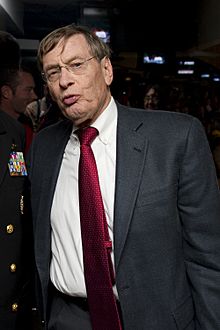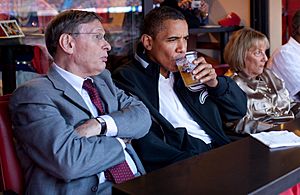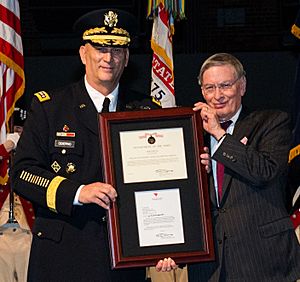Bud Selig facts for kids
Quick facts for kids
Bud Selig
|
|
|---|---|

Selig in 2010
|
|
| Commissioner Emeritus of Baseball | |
| Life tenure January 25, 2015 |
|
| Preceded by | Position created |
| 9th Commissioner of Baseball | |
| In office July 9, 1998 – January 25, 2015 Acting: September 7, 1992 – July 9, 1998 |
|
| Preceded by | Fay Vincent |
| Succeeded by | Rob Manfred |
| Personal details | |
| Born |
Allan Huber Selig
July 30, 1934 Milwaukee, Wisconsin, U.S. |
| Spouses |
Donna Chaimson
(m. 1956; div. 1976)Suzanne Lappin Steinman
(m. 1977) |
| Alma mater | University of Wisconsin–Madison (BA) |
|
Baseball career |
|
| Induction | 2017 |
| Vote | 93.8% |
| Election Method | Today's Game Era Committee |
Allan Huber "Bud" Selig (born July 30, 1934) is an American baseball leader. He is known for being the ninth commissioner of baseball, serving from 1998 to 2015. Before that, he was the acting commissioner starting in 1992. Selig helped baseball grow a lot during his time, increasing its money by 400 percent and setting new attendance records.
During his leadership, baseball faced issues with players using performance-enhancing substances. Selig worked to address this problem, introducing new rules and penalties. He also helped create the World Baseball Classic in 2006. After retiring as commissioner, he became the commissioner emeritus of baseball. In 2017, he was inducted into the Baseball Hall of Fame.
Contents
Early Life and Baseball Love
Bud Selig was born in Milwaukee, Wisconsin. He grew up in a Jewish family. His father came to the United States from Romania. Selig's love for baseball came from his mother, who was a school teacher. She took him to watch the minor league Milwaukee Brewers play when he was very young.
Selig went to the University of Wisconsin–Madison. He earned a degree in American history and political science in 1956. After serving in the U.S. Army, he worked in his family's car leasing business. Selig became a big fan of the Boston Braves when they moved to Milwaukee in 1953. He was very sad when the Braves left Milwaukee for Atlanta in 1965.
Bringing Baseball Back to Milwaukee
After the Braves left, Selig was determined to bring Major League Baseball back to Milwaukee. He formed a group called the Milwaukee Brewers Baseball Club, Inc. He arranged for major league games to be played at Milwaukee County Stadium. These games were very popular, showing how much Milwaukee fans wanted a team.
In 1969, Selig tried to buy the Chicago White Sox to move them to Milwaukee, but the league did not allow it. So, in 1970, he bought the Seattle Pilots team, which was having financial problems. He moved the team to Milwaukee and officially renamed them the Brewers.
Brewers' Success Under Selig
As the owner and president of the Milwaukee Brewers, Selig saw his team achieve great things. The Brewers made it to the playoffs in 1981 and reached the 1982 World Series in 1982. They had star players like Robin Yount and Paul Molitor, who later became Hall of Famers. The Brewers also won seven "Organization of the Year" awards during his time as owner.
In 2001, Selig was inducted into the Wisconsin Athletic Hall of Fame. A statue of him, called the Selig Monument, was unveiled outside the Brewers' stadium in 2010.
Becoming Commissioner of Baseball
Selig became a strong voice among team owners. In 1992, the previous commissioner, Fay Vincent, resigned. Selig then became the chairman of the Executive Council of Major League Baseball, which made him the acting commissioner.
Key Changes as Acting Commissioner
As acting commissioner, Selig made several important changes:
- He introduced the Wild Card playoff spot. This allowed more teams to have a chance at the playoffs, keeping fans interested longer.
- He suspended Cincinnati Reds owner Marge Schott for a year in 1993 due to inappropriate comments.
- He reinstated New York Yankees owner George Steinbrenner after a long suspension.
- Selig represented the owners during the 1994 baseball strike. This led to the cancellation of the 1994 World Series, which was the first time that had happened since 1904.
- In 1997, he brought in interleague play, allowing teams from the National League and American League to play against each other during the regular season.
Becoming the Official Commissioner
After leading baseball for six years as acting commissioner, the team owners officially voted Selig to be the ninth Commissioner of Baseball on July 9, 1998.
During his time as commissioner, baseball avoided more work stoppages. He also combined the administrative offices of the National and American Leagues into one Commissioner's Office in 2000.
Responding to National Events
After the terrorist attacks on September 11, 2001, Selig ordered all baseball games postponed for a week. This was done out of respect for the victims and for the safety of fans and players.
All-Star Game Changes
In 2002, the All-Star Game in Milwaukee ended in a tie. This was a controversial decision by Selig because both teams had used all their players. To make the All-Star Game more exciting, Selig decided that starting in 2003, the league that won the All-Star Game would get home-field advantage in the World Series. This rule was in place until 2016.
Addressing Performance-Enhancing Substances
One of the biggest challenges during Selig's time was the issue of players using performance-enhancing substances. In 2005, Selig worked to create a stricter drug testing policy for MLB players. This new policy also banned amphetamines, which was a first for major North American sports leagues.
He also asked former U.S. Senator George J. Mitchell to lead an investigation into the use of these substances in baseball. The report, known as the Mitchell Report, was released in 2007. Selig has stated his commitment to removing performance-enhancing substances from the game.
Retirement as Commissioner
Selig announced in 2013 that he would retire in January 2015. He officially stepped down on January 24, 2015.
Notable Changes Under Bud Selig
Bud Selig oversaw many important changes in Major League Baseball:
- Teams were reorganized into three divisions per league, and wild card playoff teams were introduced (1994).
- Interleague play began (1997).
- Jackie Robinson's uniform number, 42, was retired across all MLB teams (1997).
- Two new teams were added: the Arizona Diamondbacks and the Tampa Bay Devil Rays (now the Tampa Bay Rays) (1998).
- The Milwaukee Brewers moved from the American League to the National League (1998).
- The separate offices for the American and National Leagues were removed (2000).
- Home field advantage in the World Series was given to the winner of the All-Star Game (2003-2016).
- The Montreal Expos team moved to Washington, D.C., becoming the Washington Nationals (2004).
- April 15 was dedicated as Jackie Robinson Day (2004).
- A stricter performance-enhancing drug testing policy was put in place (2005).
- The World Baseball Classic was created (2006).
- Instant replay was introduced for disputed home run calls (2008) and later expanded (2014).
- A second wild-card playoff team was added in each league (2012).
- The Houston Astros moved from the National League to the American League (2013), making both leagues have 15 teams.
Many new stadiums also opened during his time as commissioner, including in Arizona, Atlanta, Cincinnati, Cleveland, Detroit, Houston, Miami, Milwaukee, New York City, Philadelphia, Pittsburgh, San Diego, San Francisco, Seattle, St. Louis, and Washington, D.C.
Personal Life and Teaching

Bud Selig has been married twice. He has two daughters from his first marriage, which ended in 1976. Since 1977, he has been married to Suzanne Steinman.
After his time as commissioner, Selig began teaching. He has been an adjunct professor of sports law and policy at Marquette University Law School since 2009. He also teaches at the Sandra Day O'Connor College of Law at Arizona State University and the University of Wisconsin–Madison. He has supported the study of sports history by creating special teaching positions and lecture series at the University of Wisconsin.
Honors and Awards
In April 2015, Selig received the U.S. Department of the Army Outstanding Civilian Service Award for his support of soldiers, veterans, and their families. The Milwaukee Brewers also retired uniform number 1 in his honor on April 6, 2015.
In 2014, Selig was inducted onto the first Milwaukee Brewers Wall of Honor. The biggest honor came on December 4, 2016, when it was announced he was elected into the National Baseball Hall of Fame Class of 2017. He was formally inducted on July 30, 2017.
In May 2015, the Milwaukee Brewers opened the Selig Experience exhibit at American Family Field. This exhibit is a documentary about Bud Selig's life and his work for the Brewers.
 | Delilah Pierce |
 | Gordon Parks |
 | Augusta Savage |
 | Charles Ethan Porter |


